
-
 Napoli host arch-rivals Juventus riding wave of Scudetto enthusiasm
Napoli host arch-rivals Juventus riding wave of Scudetto enthusiasm
-
Alpine skiing: Five things about the Kitzbuehel downhill

-
 J-pop star Nakai to retire after sex misconduct allegations: media
J-pop star Nakai to retire after sex misconduct allegations: media
-
New rider in town: Somalia's first woman equestrian turns heads

-
 Melbourne doubles feud as Kichenok accuses Mladenovic of 'direct threat'
Melbourne doubles feud as Kichenok accuses Mladenovic of 'direct threat'
-
Trump to take virtual centre stage in Davos

-
 Friedrich Merz: millionaire conservative on verge of German chancellery
Friedrich Merz: millionaire conservative on verge of German chancellery
-
Trump's return darkens mood as Germany heads to elections

-
 Pochettino happy after 'amazing' USA beat Costa Rica
Pochettino happy after 'amazing' USA beat Costa Rica
-
Most Asian markets extend AI-fuelled rally

-
 Bangladesh student revolutionaries' dreams dented by joblessness
Bangladesh student revolutionaries' dreams dented by joblessness
-
S. Korea investigators recommend Yoon be charged with insurrection, abuse of power

-
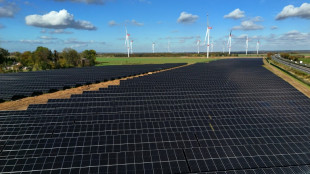 Solar power surpasses coal in EU for first time
Solar power surpasses coal in EU for first time
-
Musk, Wikipedia founder in row over how to describe 'Nazi salute'

-
 Axel Rudakubana: troubled teen whose knife rampage shocked Britain
Axel Rudakubana: troubled teen whose knife rampage shocked Britain
-
Sasaki vows to 'give best' to fire-torn LA at Dodgers unveiling

-
 UK teen faces sentencing over murders that sparked riots
UK teen faces sentencing over murders that sparked riots
-
Larry Ellison, tech's original maverick, makes Trump era return

-
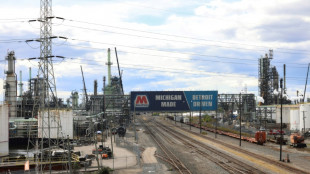 Trump push to 'drill, baby, drill' may hit industry roadblock
Trump push to 'drill, baby, drill' may hit industry roadblock
-
Instagram courts TikTok stars during turbulent times
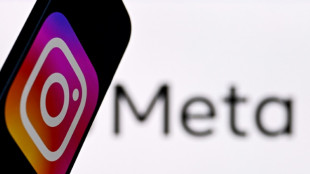
-
 Political crisis hits South Korea growth: central bank
Political crisis hits South Korea growth: central bank
-
Elephants are not people, US judges say
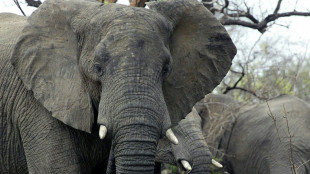
-
 Sinner aiming to be 'better, stronger' in Australian Open semi
Sinner aiming to be 'better, stronger' in Australian Open semi
-
Mass evacuations after explosive new fire erupts near Los Angeles

-
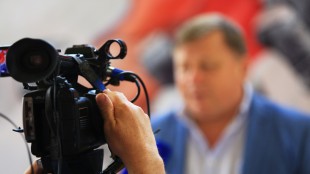 The Now Corporation (OTC:NWPN) In Conjunction With Subsidiary Green Rain Solar Inc., Launch a Visionary Video Showcasing Solar Energy Solutions
The Now Corporation (OTC:NWPN) In Conjunction With Subsidiary Green Rain Solar Inc., Launch a Visionary Video Showcasing Solar Energy Solutions
-
Guardiola concedes Man City 'could not cope' with PSG as European hopes flicker

-
 PSG push Man City to brink with stunning Champions League comeback
PSG push Man City to brink with stunning Champions League comeback
-
Arteta wants sunshine break as Arsenal move towards last 16

-
 PSG comeback floors Man City as Arsenal near Champions League last 16
PSG comeback floors Man City as Arsenal near Champions League last 16
-
Trump toughens crackdown on immigration and diversity

-
 Celtic make 'little bit of history' with Champions League progress
Celtic make 'little bit of history' with Champions League progress
-
As Trump declares 'Gulf of America,' US enters name wars
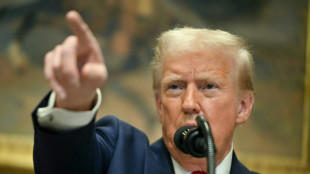
-
 Celtic make Champions League progress thanks to Young Boys own goal
Celtic make Champions League progress thanks to Young Boys own goal
-
Trump's tariff threats are 'leverage,' says informal economic advisor

-
 Trump halts refugee arrivals in crackdown
Trump halts refugee arrivals in crackdown
-
Gangs could overrun Haiti capital if aid falls short: UN chief

-
 PSG sink Man City with stunning Champions League comeback
PSG sink Man City with stunning Champions League comeback
-
Leao sinks Girona and pushes Milan into Champions League top eight

-
 Feyenoord stun toothless Bayern in Champions League
Feyenoord stun toothless Bayern in Champions League
-
Arsenal on course for last 16 after beating Dinamo

-
 Real Madrid thrash Salzburg to get back on Champions League track
Real Madrid thrash Salzburg to get back on Champions League track
-
Les Paul owned by guitar god Jeff Beck auctioned for over £1 mn

-
 Colombia moves to arrest guerrilla leaders behind wave of violence
Colombia moves to arrest guerrilla leaders behind wave of violence
-
New explosive wildfire erupts near Los Angeles

-
 Valladolid say Man City tapped up young star
Valladolid say Man City tapped up young star
-
Fear abounds as M23 fighters close in on DR Congo's Goma

-
 Sabalenka, Swiatek eye final showdown at Australian Open
Sabalenka, Swiatek eye final showdown at Australian Open
-
Musk bashes Trump-backed AI mega project

-
 Hundreds to wed as Thai same-sex marriage law comes into force
Hundreds to wed as Thai same-sex marriage law comes into force
-
Musk seeks Trump pardon for 'Bitcoin Jesus,' charged with fraud


Davos cold shoulders Russians over Ukraine war invasion
The World Economic Forum said Wednesday it was freezing all relations with Russian entities, and would not allow anyone on the sanctions list to take part in the annual high-powered meeting in Davos.
"Following its condemnation of Russia's ongoing attack on Ukraine, the forum is complying with the evolving international sanctions and following the rapidly-developing situation," the WEF said in a statement sent to AFP.
"Therefore the forum freezes all its relations with Russian entities, and will not engage with any sanctioned individual or institution in any of our activities, inclusive the annual meeting" in Davos, it added.
The announcement came as the international outcry mounts over Russia's invasion, which in two weeks has sent nearly 2.2 million people fleeing into neighbouring countries.
The West has responded with punishing sanctions, with the United States banning imports of Russian oil, one of its biggest economic weapons against Moscow.
The WEF usually hosts its annual gathering of the global political and business elite in the luxury Swiss resort of Davos in January, but the meeting has been postponed until May 22-26 this year due to concerns over the coronavirus pandemic.
- Caviar days are over -
Top Russian politicians, businessmen and oligarchs are commonly seen at the plush event.
But now, "the champagne and caviar days in Davos are over. Or at least the caviar," as Politico put it.
Among those who have been slapped with Western sanctions over the invasion is President Vladimir Putin himself, who has participated in several Davos meets.
Politico pointed out that following Russia's annexation of Ukraine's Crimean peninsula in 2014, Putin was still invited to join the following year, but opted not to come.
WEF founder Klaus Schwab had said he hoped the event could "contribute with some bridge building".
When Putin gave a video address to the meeting during the virtual event held in the pandemic year of 2021, at a time when Moscow's relations with the West were deteriorating, Schwab stressed in his introduction that it was "essential" to hear from him.
"Even and especially in times characterised by differences, disputes and protests, constructive and honest dialogue to address our common challenges is better than isolation and polarisation," the WEF founder said.
Putin told the 2021 gathering of a last-minute agreement to prolong the New Start treaty with the United States on reducing nuclear arsenals as "a step in the right direction".
But just days into his Ukraine invasion Putin ordered his country's nuclear forces to be put on high alert -- warned in last year's speech that "differences are leading to a downward spiral".
He cautioned that "the inability and unwillingness to find substantive solutions to problems like this in the 20th century led to the WWII catastrophe."
"Of course, such a heated global conflict is impossible in principle," he said.
"This is what I am pinning my hopes on, because this would be the end of humanity."
T.Perez--AT
